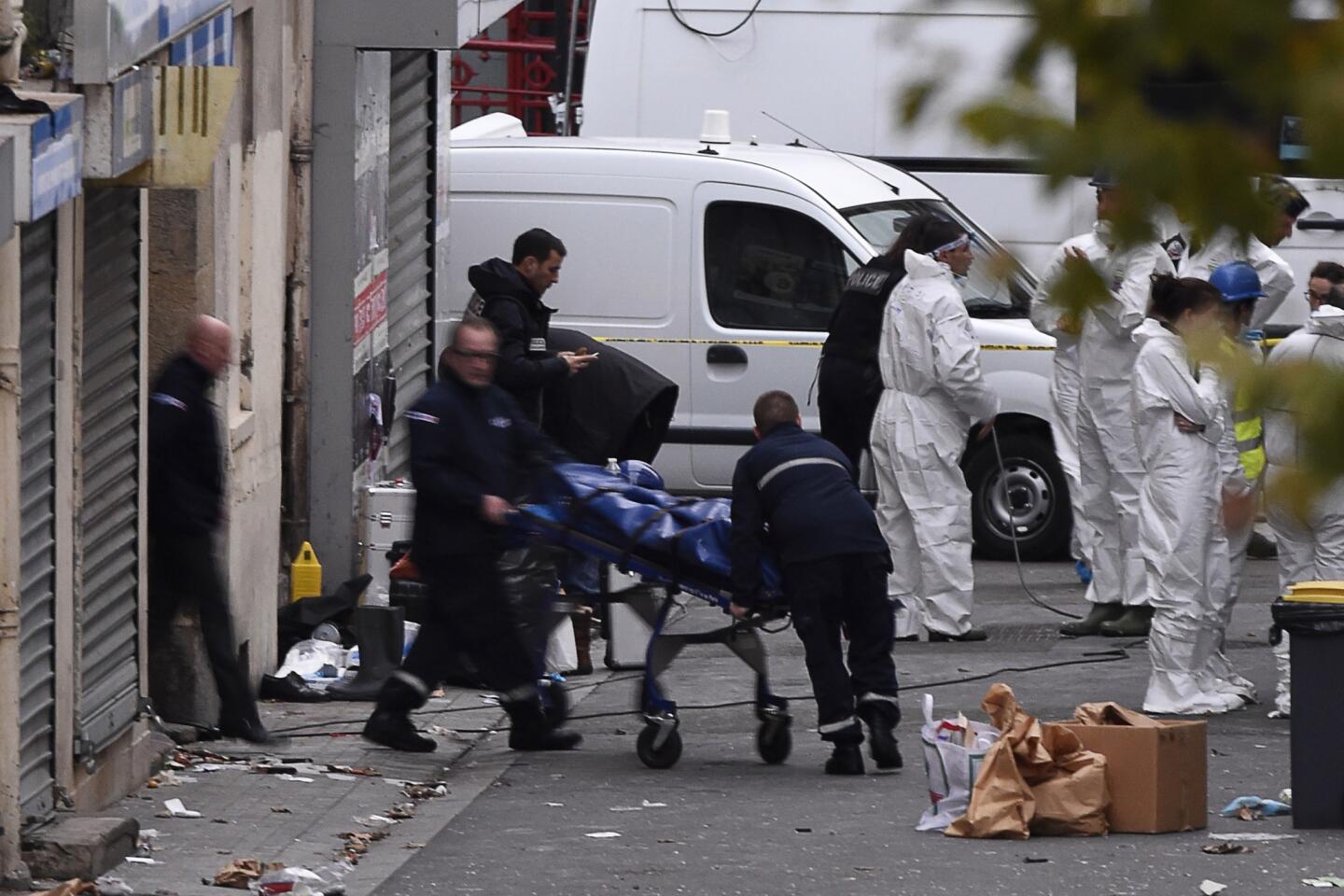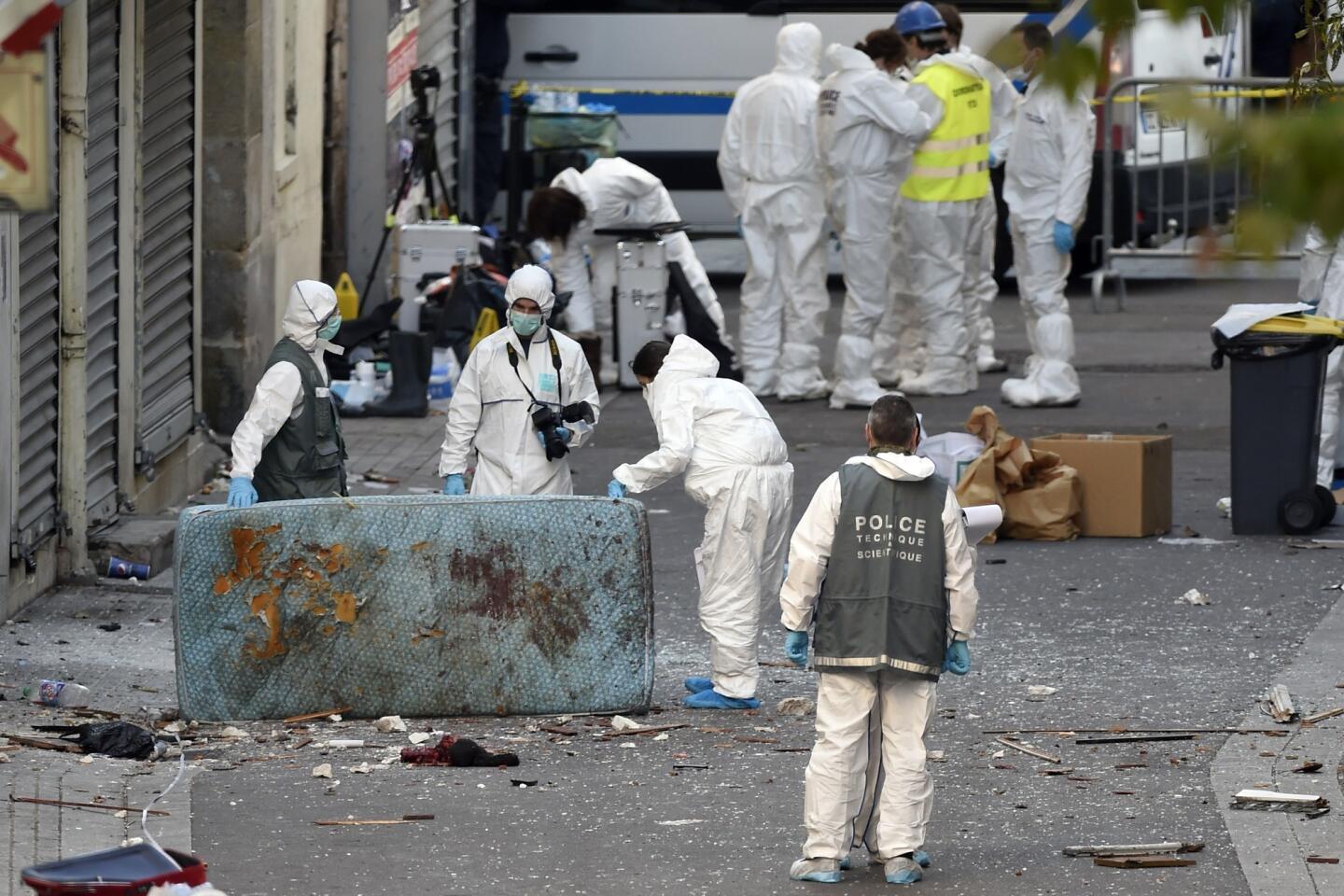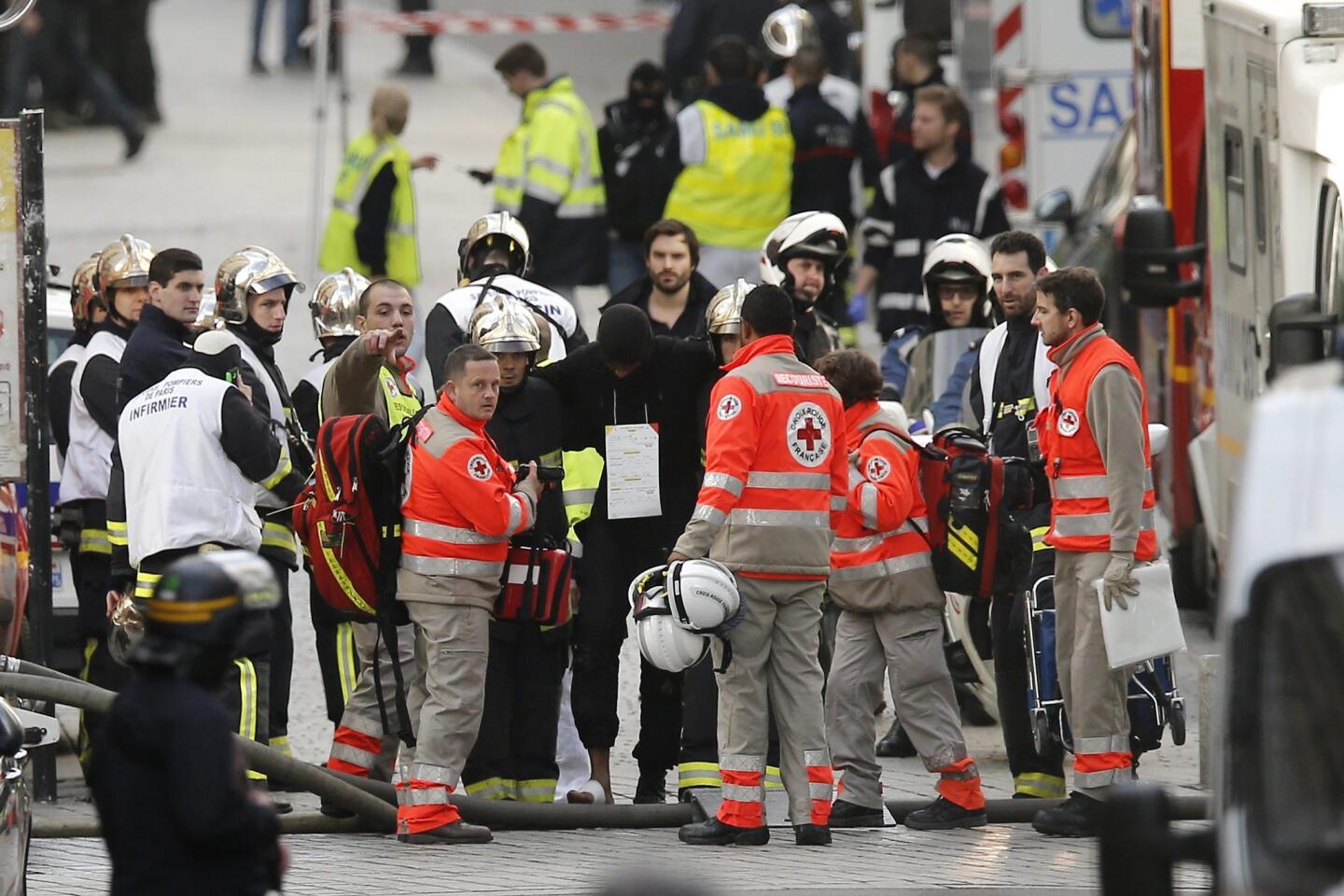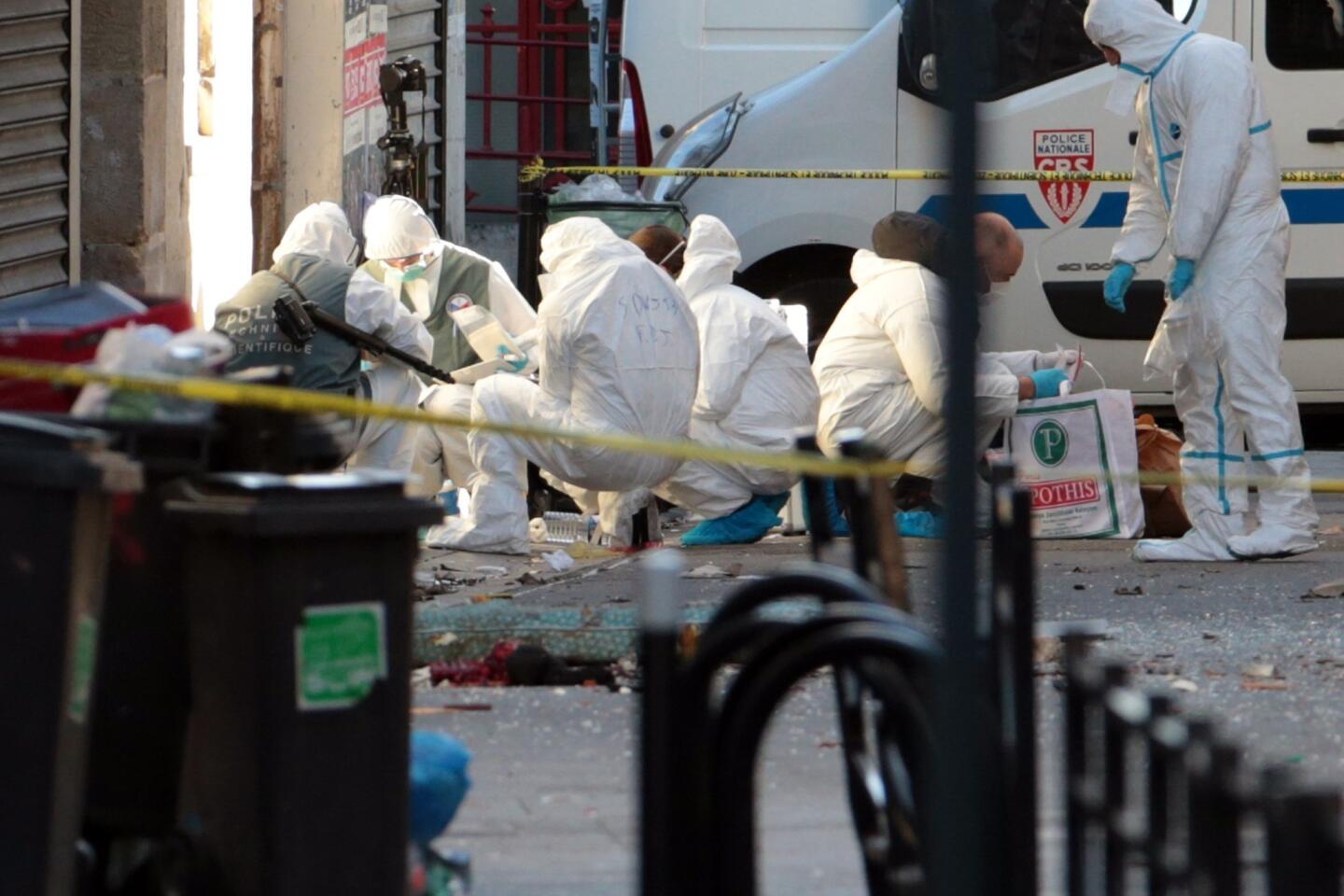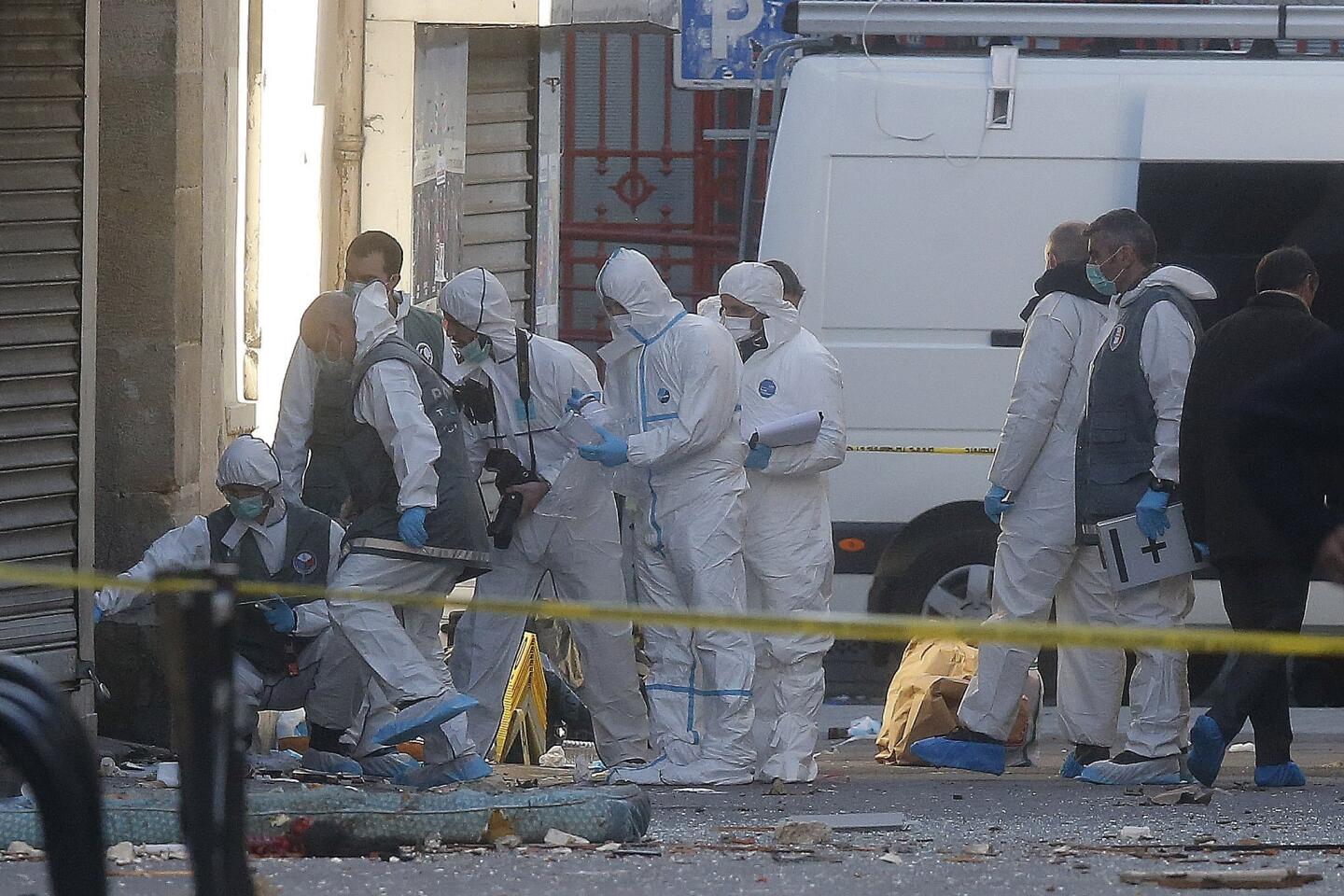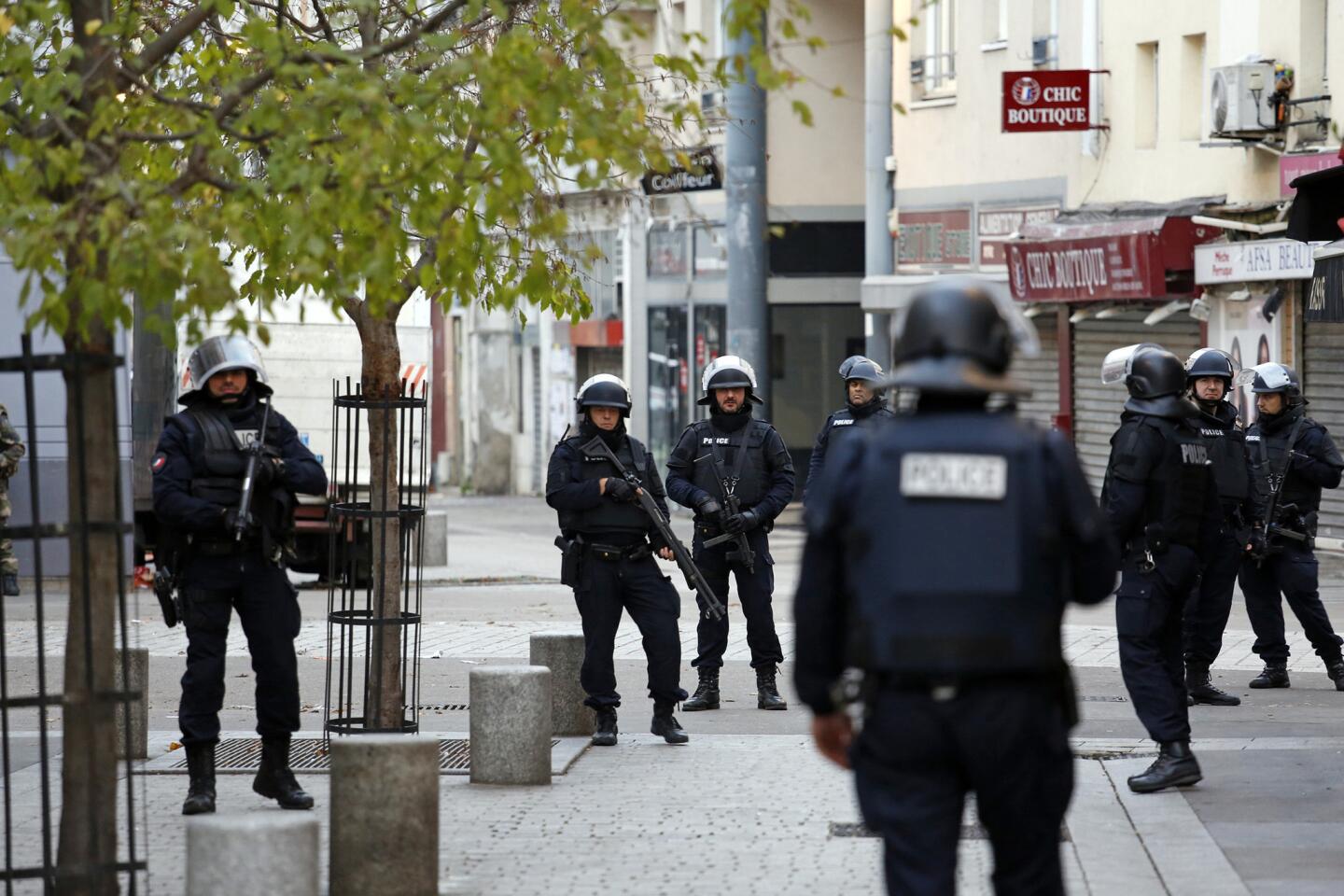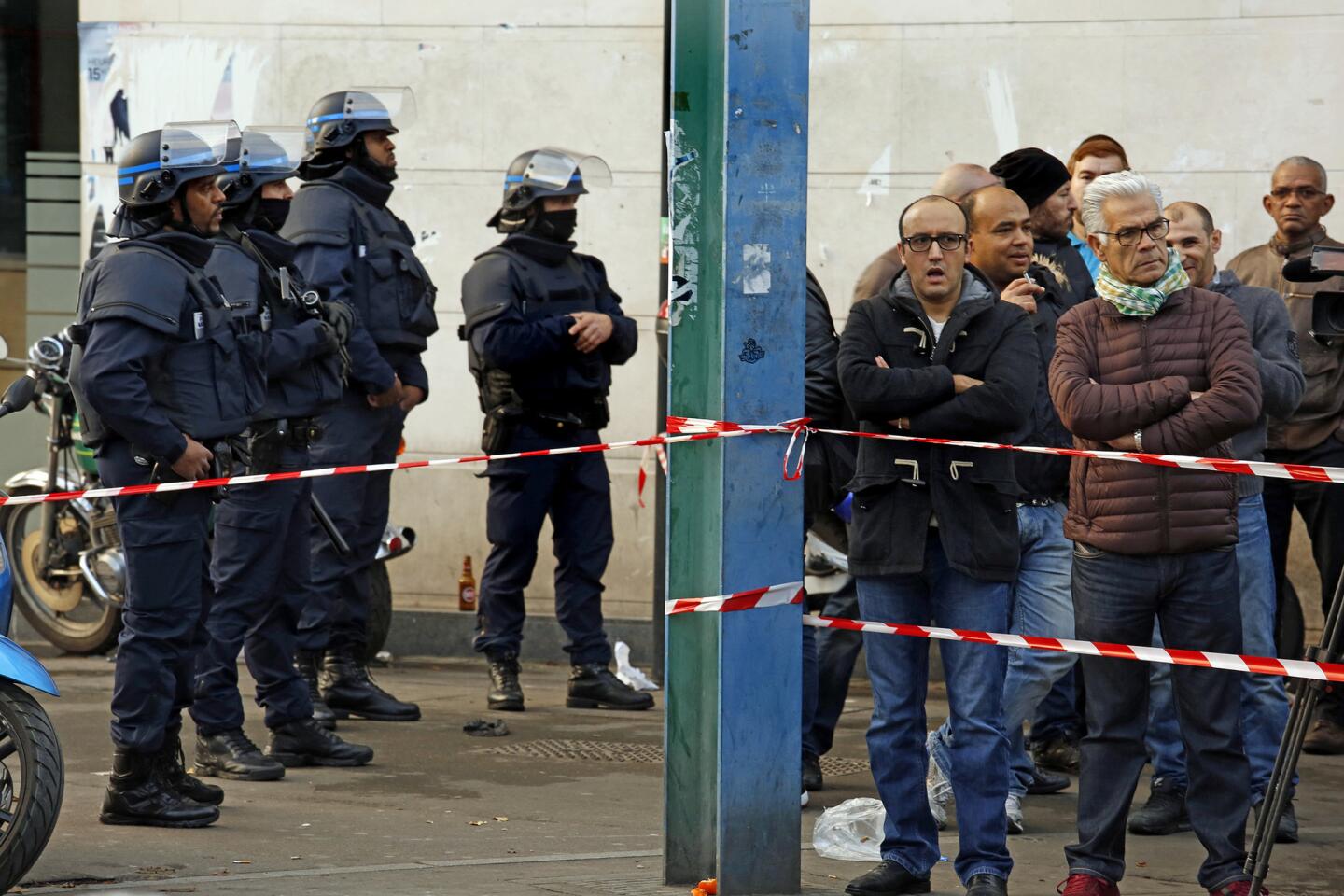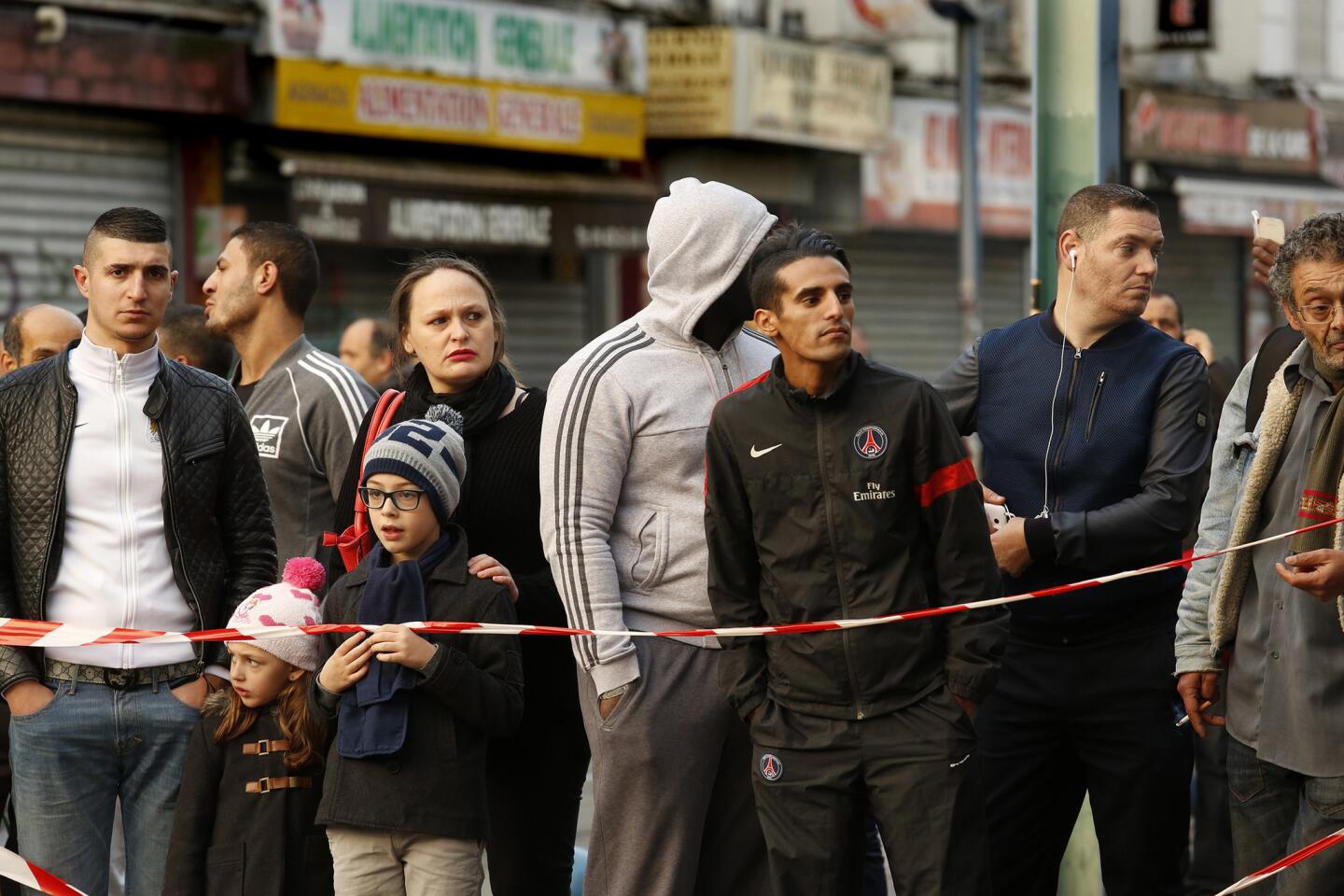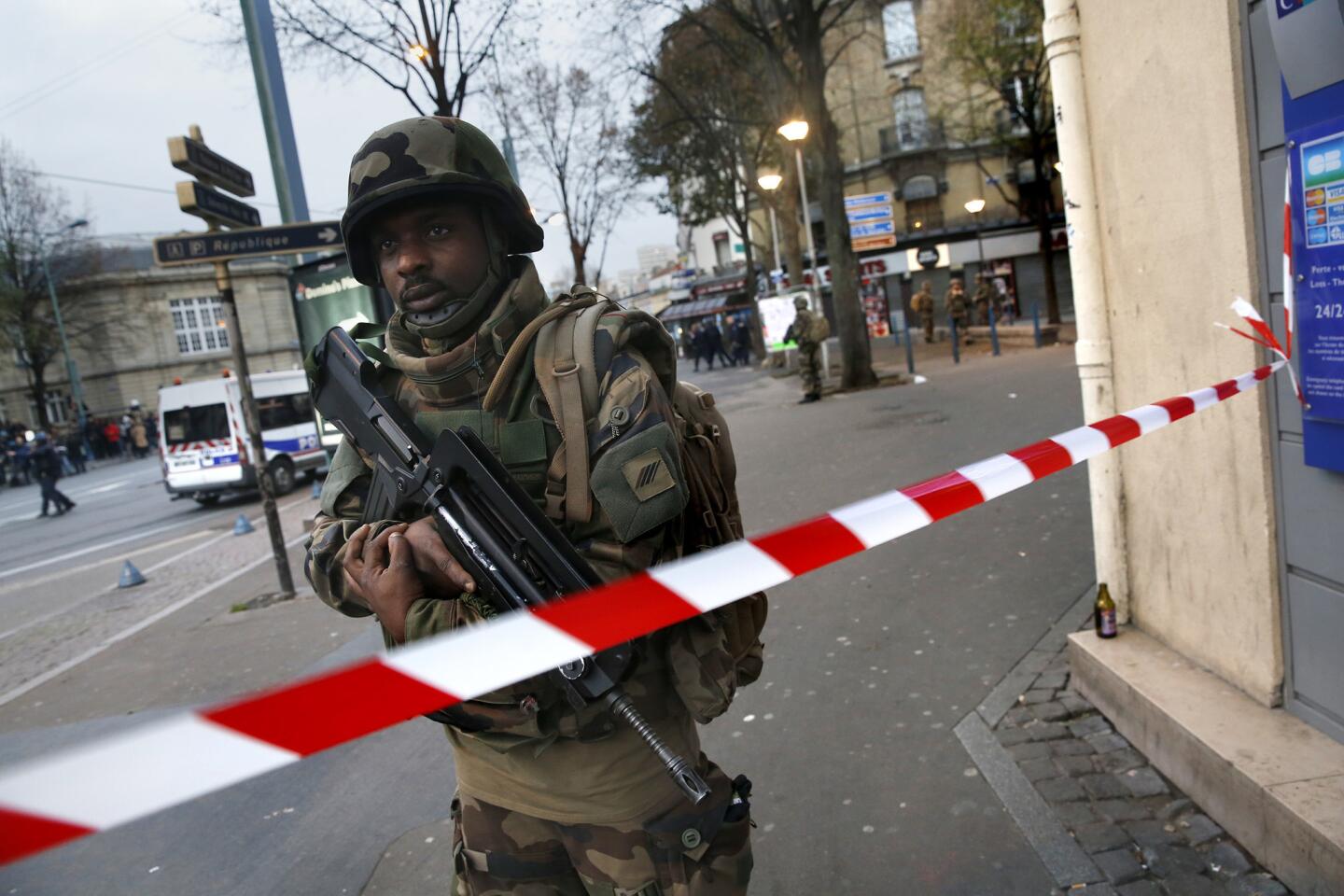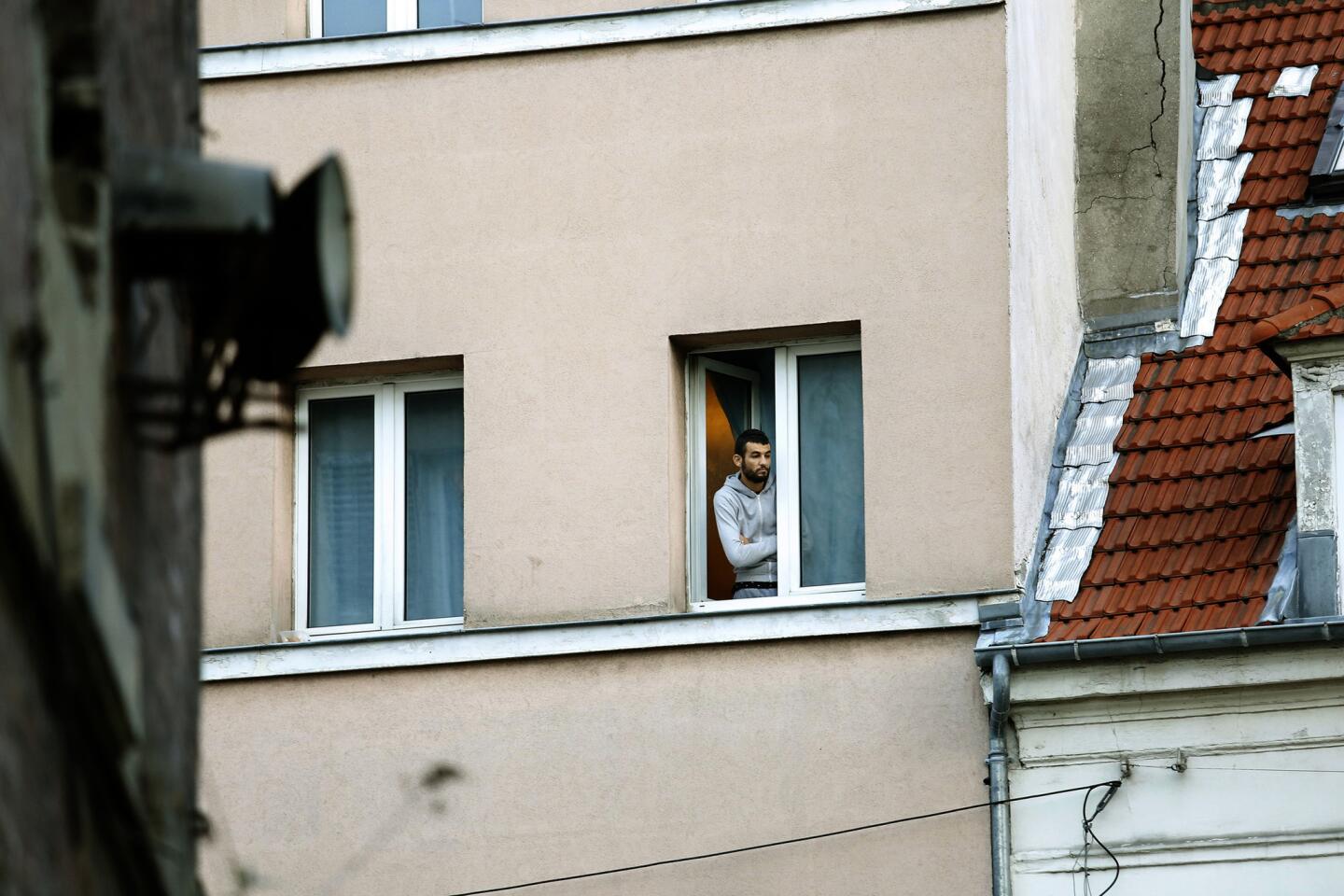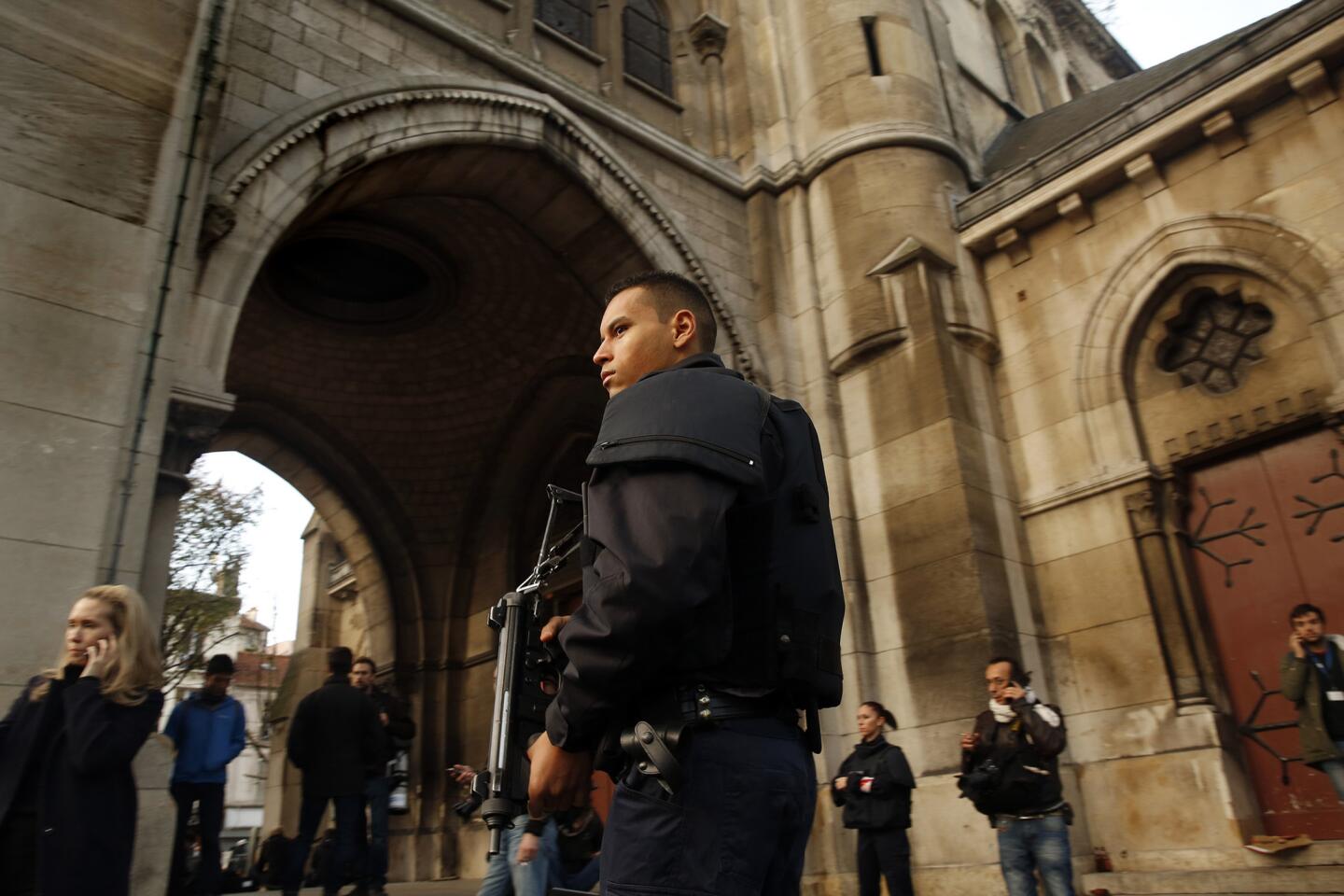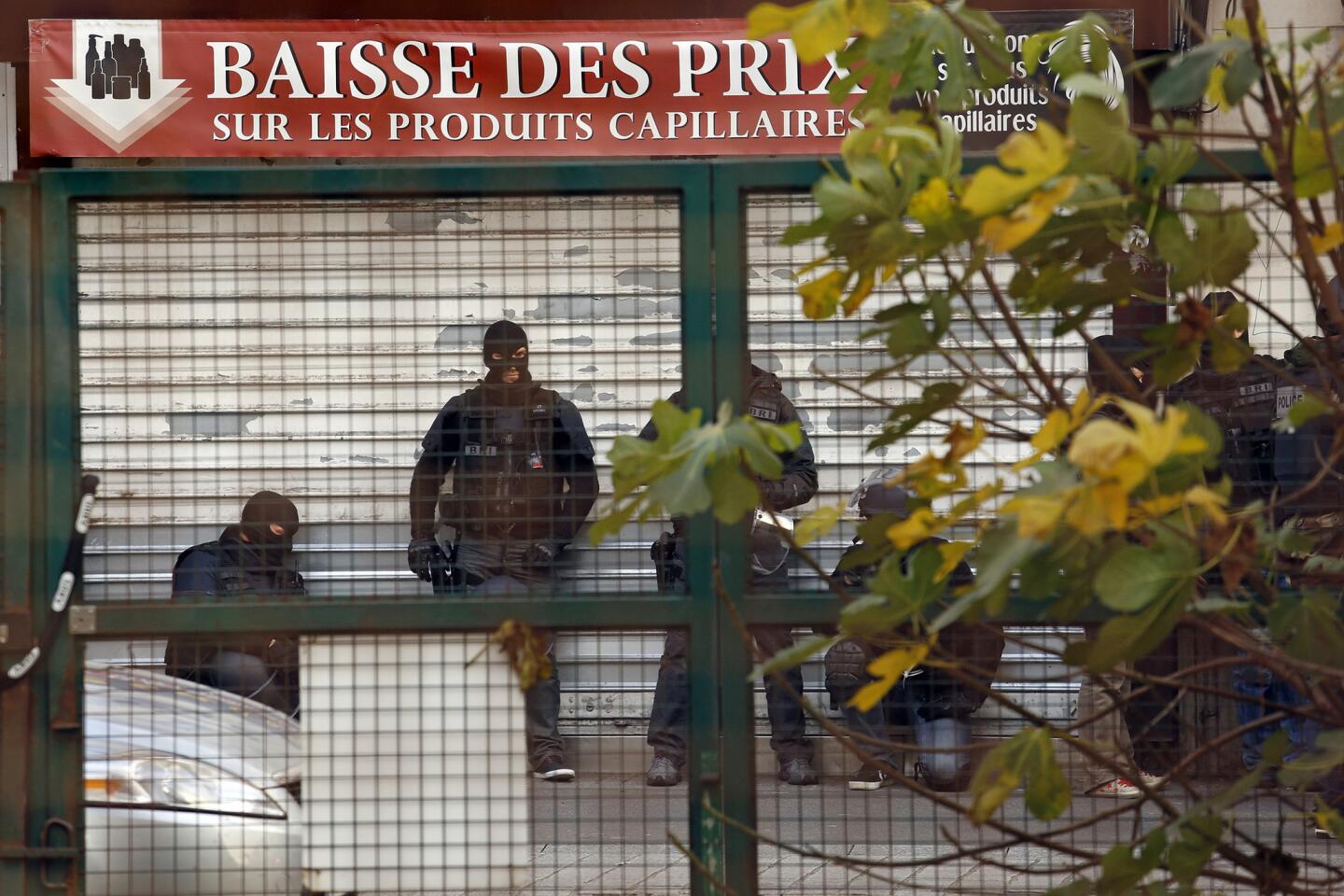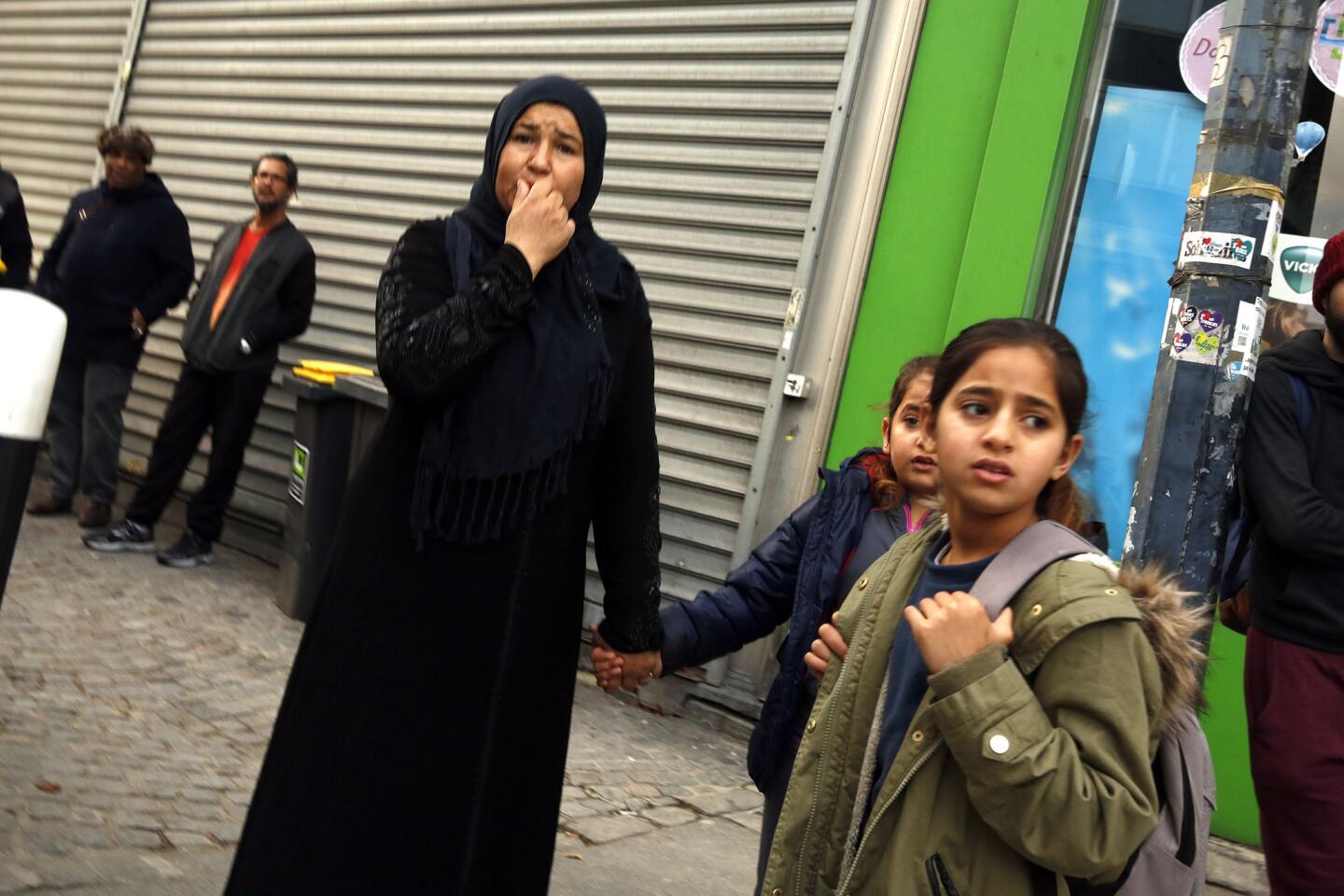French raid foils attack, fate of key suspect unclear
- Share via
Reporting from Paris — As law enforcement officials fanned out across France and Belgium in search of suspects in the deadly bombings and shootings last week, they raced against a chilling possibility: The Islamist militants behind Europe’s worst terrorist attack in more than a decade might be poised to strike again.
On Wednesday, more than 100 heavily armed police and soldiers descended on an apartment building less than a mile from a stadium targeted in Friday’s rampage and traded blistering fire with militants holed up inside.
The massive, hours-long raid in a densely populated suburb north of Paris took down another terrorist squad that was ready to act, authorities said.
Left unclear was the fate of the raid’s intended target: Abdelhamid Abaaoud, a Belgian national of Moroccan descent who is a top external operative for the extremist group Islamic State.
Authorities have described Abaaoud as the likely architect of the attacks that killed at least 129 people and injured hundreds on a night out at cafes and restaurants, a rock concert and a soccer game.
A French prosecutor, Francois Molins, told reporters that Abaaoud was not among eight people taken into custody during the operation in St.-Denis. Neither was a suspected accomplice, Salah Abdeslam.
At least two suspects died during the operation, including a woman who blew herself up with an explosives vest and a person found amid the rubble.
Some press accounts here described the female attacker as a cousin of Abaaoud. But Molins said the fighting was so intense that it would take time to identify the remains and determine whether anyone else was killed.
A U.S. law enforcement official in Washington, who had been briefed on the operation, said Abaaoud may have been among two suspects who escaped a near-simultaneous raid at another location. But there was no confirmation from French authorities.
The raid, which largely destroyed the three-story apartment house targeted, was launched after authorities received information that Abaaoud might be holed up on the third floor.
Gunfire and explosions reverberated through the neighborhood as SWAT teams descended on the building at 4:20 a.m. The door to the apartment had been reinforced, making it difficult to break down and giving the occupants time to prepare, Molins said.
Police fired more than 5,000 rounds during a gunfight that went on for nearly an hour, he said. The operation ended at midday after a seven-hour siege.
“A new team of terrorists has been neutralized and everything suggests — their armament, their structured organization and their determination — that this commando was ready to act,” Molins said.
Islamic State has claimed responsibility for the Paris attacks.
On Wednesday, the extremist group took an opportunity to boast about both the shootings and bombings in Paris and the downing last month of a Russian airliner over Egypt.
“Like Russia, [France] was blinded by hubris, thinking that its geographical distance ... would protect it from the justice of the mujahedin,” the group said in its English-language publication, Dabiq.
“The Islamic State launched its brave knights to wage war in the homelands of the wicked crusaders, leaving Paris and its residents ‘shocked and awed.’”
The Syria-based group, which is the target of a U.S.-led bombing campaign, also said it had killed a Norwegian and a Chinese captive.
The group had earlier identified the Norwegian man as Ole Johan Grimsgaard-Ofstad, 48, from Oslo, and the Chinese man as Fan Jinghui, 50, a freelance consultant from Beijing.
French President Francois Hollande has declared that his country is “at war” with the group and promised an all-out offensive against extremism. In Paris, authorities presented a bill to the Council of Ministers to extend for three months the state of emergency that Hollande declared Saturday.
The proposed law gives authorities significant powers, including the ability to detain under house arrest anyone whose behavior “constitutes a threat to security and public order.”
It allows authorities to conduct searches in homes, vehicles and public places without a judicial warrant if there is reason to think the location is frequented by someone who is a security threat. Computers and phones at such locations would also be subject to search, including cloud-stored data from such devices.
Authorities believe that the attacks on Paris were initiated by Islamic State’s leadership in Syria and organized in Belgium with the help of French accomplices.
Abaaoud has been linked to several previous plots in Europe and openly bragged in an Islamic State propaganda publication about his ability to elude Western intelligence agencies.
The suspected ringleader appears to operate with trusted foot soldiers linked to Molenbeek St. Jean, a gritty district outside Brussels that has become a hotbed of militant recruits who have traveled to Syria and joined Islamic State and other extremist factions.
The three cars believed to have been used Friday during the rampage arrived in Paris the day before in a convoy from Belgium, Molins said.
A cellphone recovered from a trash can near the Bataclan concert hall, where 89 people were killed, helped lead investigators to safe houses used by the attackers, including one in the northeast suburb of Bobigny and another in the southeast suburb of Alfortville, he said.
Molins shared the final text message sent from the phone at 9:42 p.m. Friday: “We’re off. We have started.”
Residents of St.-Denis, a mostly working-class neighborhood with a large immigrant population, were evacuated and police cordoned off the area where the raid took place.
Five officers were slightly injured in the operation, police said in a statement, and a police dog was killed “by the terrorists.”
French police teams continued their work in the vicinity of the safe house long after the raid ended. Shops remained shuttered on the cobblestone main drag, Rue de la Republique, and many residents were still unable to return to the cordoned-off streets.
“We hear a lot of shooting around here — it’s a pretty dangerous neighborhood — but I never heard anything like this,” said Cesar Quintero, 34, a native of Colombia who, like many others, could not make it to work Wednesday because public transportation had been shut down. “We knew something was going to happen though. There were a lot of police around the last few days.”
Other young men posed for selfies with cellphones outside the police barricades. The international press rushed to the area. News media satellite trucks were parked across from City Hall.
At the central square, Place Victor Hugo, a banner hung after the attacks Friday proclaimed that the best way to confront “barbarity” was for France to face the threat directly “together.” The banner was one of a number of efforts in France to foster solidarity in the aftermath of the attacks.
Authorities have urged people to not be intimidated and to go about their normal lives. Many Parisians have been frequenting cafes and nightspots despite the attacks and fear that other strikes could be imminent. Makeshift memorials of flowers and candles honoring those killed continue to attract mourners and well-wishers, many of whom leave handwritten notes in remembrance of victims.
In another development, French authorities said Wednesday that all 129 people killed in last week’s attacks have been identified. Relatives and friends of the dead have been coming forward to identify the victims. Members of more than 100 families have participated in the identification process, the government said in a statement.
The death toll in France’s deadliest terrorist attack could still rise, authorities said. More than 350 people were injured in the rampage and many remain in critical condition.
Seven suspects died in Friday’s attacks, by suicide bombs or at the hands of police.
Authorities have launched a manhunt for Abdeslam, brother of one of the suicide attackers reported killed in the strikes. Investigators believe yet another suspect may have gotten away after taking part in Friday’s carnage, but the person has not been identified.
Since the attacks, France has stepped up its bombing campaign against Islamic State in Syria. France is part of the U.S.-led coalition that has been attacking the group. Russia has also been conducting a bombing campaign against Islamic State in Syria, as well as hitting other insurgent groups there.
Islamic State, which arose from the chaos of the Syrian conflict, has drawn hundreds of militants from European nations, including France and Belgium.
McDonnell reported from Paris and Zavis from Los Angeles. Times staff writer Richard A. Serrano in Washington contributed to this report.
Follow @mcdneville and @alexzavis on Twitter
MORE ON THE PARIS ATTACKS
French investigators believe another attacker could still be at large
2 Air France flights to Paris diverted because of bomb threats
Republican rhetoric will become an Islamic State recruiting tool, Obama says
More to Read
Sign up for Essential California
The most important California stories and recommendations in your inbox every morning.
You may occasionally receive promotional content from the Los Angeles Times.
